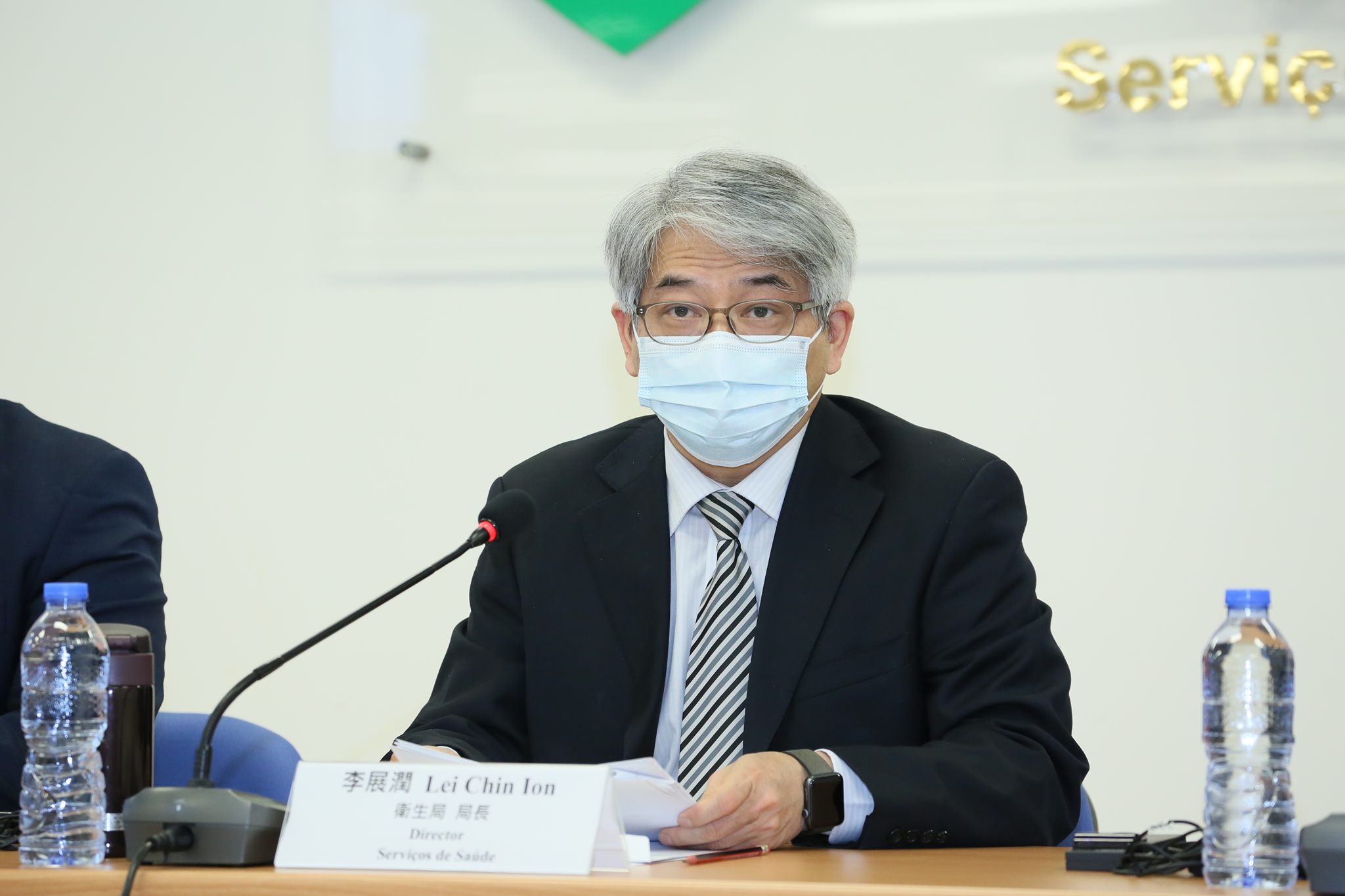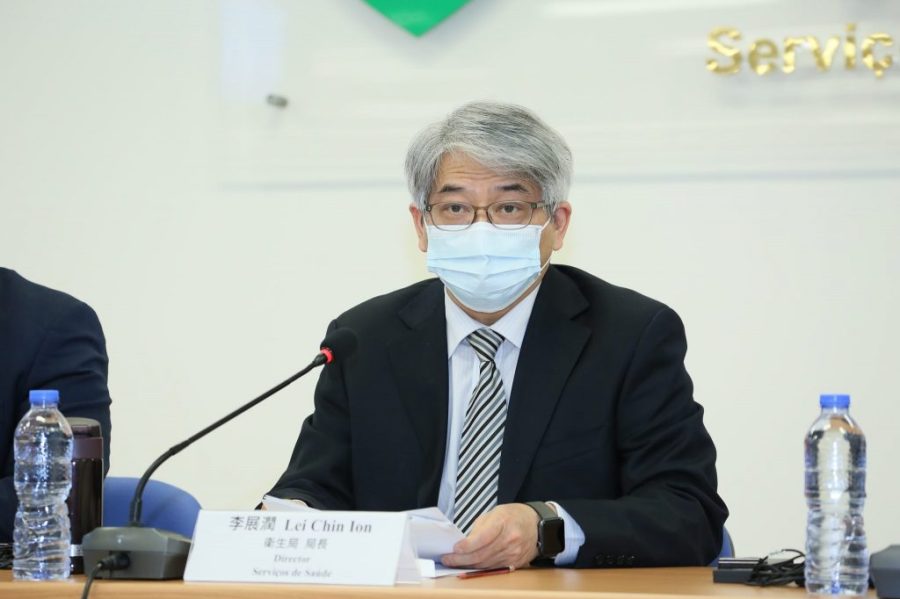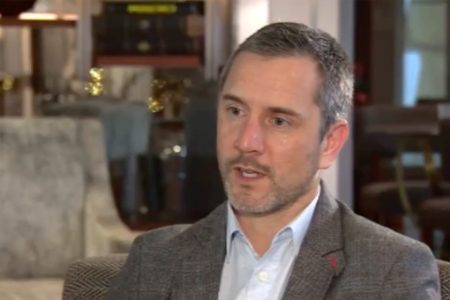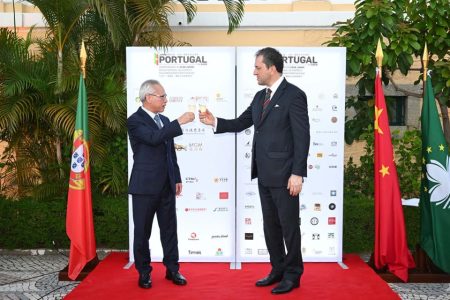Addressing Thursday’s daily press conference about Macau’s novel coronavirus (COVID-19) situation, Health Bureau (SSM) Director Lei Chin Ion said that the risk of the COVID-19 epidemic in Macau “can be regarded” as having been reduced “for the time being”, after the city has not confirmed a new COVID-19 case for more than two weeks, while urging residents to keep up all the necessary preventive measures, namely refraining from going out, always wearing a facemask when out and about and washing their hands frequently, as new cases are constantly confirmed in neighbouring regions.
Lei made the remarks on Thursday evening at the bureau adjacent to the public Conde de São Januário Hospital Centre.
Macau has not confirmed a new COVID-19 case for 16 consecutive days. Macau’s last two COVID-19 cases, the 9th and 10th cases, were confirmed on February 4. Among the 10 COVID-19 patients, six have meanwhile been discharged from hospital. The 10 cases comprise seven tourists from Wuhan and three locals.
“As no new [COVID-19] cases have been confirmed [in Macau] for more than two weeks, we may say that temporarily the risk of Macau’s novel coronavirus epidemic has been reduced, and also [all] the people who had been in close contact with confirmed patients do not have [any COVID-19] symptoms after completing 14 days of medical surveillance,” Lei said.
Lei was quick to add that Macau is still facing a risk as new cases are constantly confirmed in neighbouring regions so that the local government needs to continue to closely monitor the epidemic elsewhere outside Macau.
Medical examinations for visitors & parallel traders
Meanwhile, Lei also reaffirmed that the new medical examination measure for visitors and parallel traders (colloquially known in Cantonese as “seoi haak” or “water guests”) from COVID-19 high-prevalence regions, which took effect at 00:00 on Thursday, is needed to prevent the occurrence of a community outbreak in Macau.
The local government announced on Wednesday that visitors arriving from COVID-19 high-prevalence regions have to undergo a medical examination – which lasts several hours. The local government has set up two stations where medical staff members carry out the medical examinations – one at the Workers Stadium next to the Barrier Gate checkpoint for visitors arriving at the border checkpoints on the peninsula and the other at the Taipa Ferry Terminal for visitors arriving at the border checkpoints in Taipa and Cotai.
According to Wednesday’s announcement, the new measure also covers Macau residents who cross Macau-Zhuhai border checkpoints “multiple times abnormally” per day – i.e. suspected parallel traders who travel between the two cities more than three times a day. The government said on Wednesday that the visitors from COVID-19 high-prevalence regions cover all those who have arrived in Macau from Zhuhai because Guangdong province is a high-prevalence region. Concerning those who have arrived in Macau by air, the local authorities will ask them whether they have been in any high-prevalence regions 14 days prior and they must tell the truth, the government said on Wednesday.
Medical examination lasting 6 to 8 hours
During Thursday’s press conference, Lei said that the medical examinations need to take six to eight hours, during which the bureau’s doctors or nurses check visitors at least every two hours, such as measuring their temperature and asking them what symptoms they have. Visitors who have COVID-19-like symptoms or feel unwell, they will be taken to the public hospital for further examinations, Lei said.
Until 4 p.m. on Thursday, 784 visitors from COVID-19 high-prevalence regions had been taken to the Workers Stadium station for a medical examination on Thursday – the first day of the implementation of the measure, while 184 had been taken to the Taipa Ferry Terminal check station, Wong Kim Hong, acting chief of the Residency and Stay Permit Affairs Department of the Public Security Police (PSP) said during Thursday’s press conference, which started at 5 p.m. According to Wong, 544 visitor arrivals had chosen to return to the mainland after they were unwilling to undergo a medical examination.
According to Wong, until 4 p.m. on Thursday, 46 Macau residents had to undergo a medical examination due to their repeated border crossings between Macau and Zhuhai, only accounting for 0.6 percent of the 7,274 entries and exits made by local residents during the period.
Lei said that by the time of Thursday’s press conference, three visitors from COVID-19 high-prevalence regions needed to be taken to the public hospital for further examinations – comprising one with respiratory symptoms and two with other symptoms.
Visitor arrivals taking antipyretics targeted
Lei said he had noticed that some visitors and local residents doubted why the medical examination needs to take six to eight hours. Lei noted that symptoms can vary during a certain period of time, adding that the six-to-eight-hour practice particularly targets those who have taken antipyretics (medication reducing fever) before their intended entry into Macau. Lei said that it takes up to eight hours for the antipyretics to lose their effect so that only afterwards could the medical personnel confirm whether a visitor is really free from fever.
Lei urged visitors and local residents who are ordered to undergo the medical examination to cooperate and show understanding, underlining that the measure aims to allow the health authorities to detect early potential COVID-19 cases so as to minimise the risk of the occurrence of a community outbreak in Macau.
Lei warned that those who refuse to undergo the medical examination would possibly be held criminally responsible or ordered to undergo quarantine.
Lei said that the medical examination measure at the two stations required “very large human resources and material resources”, adding that the measure aimed to ensure local residents’ health by enabling early detections of potential COVID-19 cases. Lei noted that on Thursday one visitor out of hundreds of arrivals was found to have respiratory symptoms, adding that it’s worth implementing the measure even though the authorities could, for instance, only detect a patient out of 10,000 people.
High-prevalence regions
Meanwhile, Lei noted that currently the regions on the mainland classified by the authorities there as COVID-19 high-prevalence regions comprise the provinces of Guangdong, Henan, Zhejiang, as well as the municipalities of Beijing, Chongqing and Shanghai, adding that therefore visitors arriving from these regions must undergo the medical examination.
Residents of Hubei are currently forbidden to leave the province.
Lei said that the local authorities will continue to monitor whether any other provinces and municipalities on the mainland have been classified by the authorities there as COVID-19 high-prevalence regions, based on the change in the epidemic there.
Lei mentioned as an example that despite Guangdong only having confirmed one new case on Thursday – by the time of Thursday’s press conference, the province is still classified as a COVID-19 high-prevalence region because it has confirmed over 1,000 cases. Lei said that if no new cases are confirmed in Guangdong next week, the province could be removed from the high-prevalence list despite having over 1,000 cases cumulatively.
Show understanding for non-resident workers: Lei
Meanwhile, Lei noted that a large number of non-residents who live in Zhuhai have moved to Macau to temporarily live here – after Thursday’s implementation of the 14-day quarantine measure for migrant workers, urging local residents and non-resident workers to show mutual understanding, tolerance and cooperation.
The government announced on Monday that non-resident workers who have been on the mainland 14 days before their intended entry into Macau have to stay under medical surveillance for 14 days in a place in the adjacent city of Zhuhai arranged by the health authorities there and then obtain a health certificate issued by the Zhuhai health authorities confirming that they have not been infected with the novel coronavirus, before they will be allowed to enter Macau.
According to Monday’s announcement of the new measure, those who intend to enter Macau but cannot obtain the required health certificate – for instance those who have arrived in Macau by air – will have to remain under medical surveillance for 14 days in a place in Macau arranged by the local health authorities.
According to local media reports, a large number of non-resident workers rushed to move to Macau over the past few days to temporarily live here after the government announced the new measure on Monday.
Lei said the fact that suddenly many more non-residents are temporarily living in Macau may cause inconvenience to some local residents. However, Lei stressed that non-resident workers have contributed to the development of Macau’s civil society and that they are healthy and do not carry the novel coronavirus, nor are they COVID-19 patients. “Please think what would become of Macau without the non-resident workers,” Lei asked rhetorically.
(The Macau Post Daily/Macau News)
PHOTO © Government Information Bureau (GCS)






